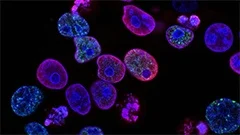Introduction
Mitosis, a fundamental process in eukaryotic cell biology, is responsible for the growth and development of organisms through the replication of somatic cells. This essential process ensures proper cell division, chromosome segregation, and maintains genomic integrity during cellular reproduction. In this comprehensive course, we will delve into the intricacies of mitosis, exploring its phases, mechanisms, regulation, and significance in maintaining cellular homeostasis.
Historical Background
Mitosis was first observed by Walther Flemming in the late 19th century during his studies on the salamander's sperm cells. Since then, numerous scientists have contributed to our understanding of this vital process, shedding light on its importance and complexities.
Importance of Mitosis
Mitosis is essential for the following processes:
- Growth: The growth and development of an organism primarily depend on mitosis, as it allows new cells to be generated from existing ones. This expansion of tissues is crucial for the growth and repair of various organs.
- Tissue Regeneration: In case of tissue damage or loss, mitosis plays a pivotal role in replacing lost or damaged cells, facilitating healing and regeneration.
- Asexual Reproduction: During asexual reproduction, mitosis is responsible for generating the necessary number of daughter cells required for the formation of new organisms (e.g., budding in yeast).
- Maintenance of Homeostasis: Through proper cell division, mitosis ensures that the population of cells within an organism remains balanced, preventing overgrowth or underpopulation in specific tissues and organs.
The Stages of Mitosis
Mitosis is divided into several distinct stages, each characterized by unique morphological and physiological changes. Understanding these stages is crucial for comprehending the intricacies of cell division and chromosome segregation.
Prophase
Prophase marks the beginning of mitosis, during which the chromatin condenses into visible chromatids (sister chromatids) that are connected by a centromere. The nuclear envelope breaks down, allowing the cytoplasm to mix with the chromosomes. Additionally, spindle fibers begin to form from microtubules originating from centrosomes, which will later facilitate the movement of chromosomes during mitosis.
Prophase Checkpoint
The prophase checkpoint ensures that the cell is prepared for mitosis by confirming that DNA replication is complete and chromatin condensation has occurred correctly. If any issues are detected, the cell cycle will be arrested at this stage to allow time for repair or apoptosis (programmed cell death).
Prometaphase
During prometaphase, the nuclear envelope reforms around the chromosomes temporarily, forming small nuclear vacuoles. Spindle fibers continue to grow and attach to the centromeres of each chromatid, preparing them for movement during metaphase.
Prometaphase Checkpoint
The prometaphase checkpoint ensures that all chromosomes are properly attached to spindle fibers before proceeding to the next stage. If any unattached or improperly attached chromosomes are detected, the cell cycle will be arrested at this stage to allow time for correction.
Metaphase
In metaphase, the chromatin condenses further, and the chromosomes align along the equatorial plane of the spindle, ensuring proper segregation during anaphase. The nuclear envelope disintegrates once again, allowing the spindle fibers to interact directly with the chromatids.
Metaphase Checkpoint
The metaphase checkpoint confirms that all chromosomes are properly aligned at the metaphase plate, ready for separation during anaphase. If any issues are detected, the cell cycle will be arrested at this stage to allow time for correction.
Anaphase
Anaphase is characterized by the separation of sister chromatids and their movement towards opposite poles of the cell. The spindle fibers attached to each centromere exert tension, causing them to move apart. This results in the formation of two distinct sets of chromosomes within the cytoplasm.
Telophase
During telophase, each set of chromosomes reaches a pole of the cell and begins to decondense back into chromatin. New nuclear envelopes form around each set of chromatids, and spindle fibers disassemble. The cell cycle is now ready for cytokinesis, which will divide the cytoplasm and create two separate daughter cells.
Telophase Checkpoint
The telophase checkpoint ensures that all chromosomes have separated correctly and are located within their respective nuclear envelopes. If any issues are detected, the cell cycle will be arrested at this stage to allow time for correction.
Cytokinesis
Cytokinesis is the final stage of mitosis, during which the cytoplasm is physically divided into two separate daughter cells. This division occurs via a contractile ring composed of actin and myosin filaments that constrict along the cell equator, pinching off the cytoplasm to create two distinct cells.
Regulation of Mitosis
Mitosis is regulated by multiple factors, including growth signals, checkpoints, and cyclins. These regulators ensure proper timing, coordination, and completion of each phase of mitosis while maintaining genomic integrity.
Cyclin-Dependent Kinases (CDKs)
CDKs are a family of enzymes that play essential roles in the regulation of the cell cycle by controlling the phosphorylation of various proteins involved in mitosis. CDK activity is regulated by cyclins, which bind to and activate CDKs at specific stages of the cell cycle.
Conclusion
Mitosis, a critical process in eukaryotic cell biology, ensures proper cell division, chromosome segregation, and maintains genomic integrity during cellular reproduction. By understanding the intricacies of mitosis and its phases, we gain insights into the fundamental mechanisms that govern growth, development, and tissue regeneration in organisms.
MCQ: Test your knowledge!
Do you think you know everything about this course? Don't fall into the traps, train with MCQs! eBiologie has hundreds of questions to help you master this subject.
These courses might interest you
Create a free account to receive courses, MCQs, and advice to succeed in your studies!
eBiologie offers several eBooks containing MCQ series (5 booklets available free for each subscriber).


